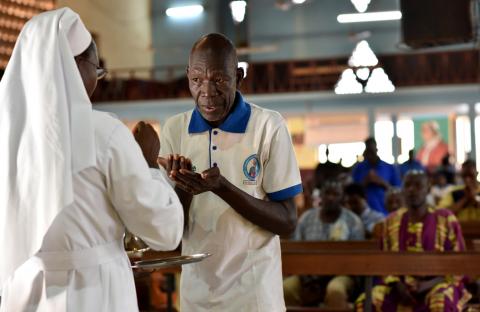Advertisement
Christians seek refuge after deadly Burkina attacks
KAYA, Burkina Faso (Reuters) - Concerned about a rise in violence against Christians in Burkina Faso, Pastor Jacques Ouedraogo changed the time of his Sunday service as a precaution. He believes this is what saved his life.
Later, his church was one of two targeted by gunmen on May 12 in the town of Dablo in a series of deadly attacks on churches and a religious procession in the last two weeks in Burkina's formerly peaceful Central North region.
"I could have been one of the martyrs who fell on Sunday," said the priest.
"We've told ourselves our turn will come. Today Christians are potential targets. We're all scared."
In the wake of Sunday's bloodshed, he and hundreds of residents fled Dablo. The town had previously served as a safe haven for some of the thousands displaced by violence in the country's northern Sahel region, which has become a stronghold for militant groups with links to Islamic State and al Qaeda.
Around 90 kilometres south of Dablo, the city of Kaya has become a refuge for those newly displaced, including a farmer, who asked to be identified by the name Te Wende. Along with his his wife, mother, grandmother and two children, he was warned by neighbours to flee.
"When the shooting started, they called us straight away and told us to run far away," he said.
"We don't know where they came from or what they really wanted," he said.
On Thursday, the United Nations warned that the Central North region had become the new epicentre for attacks.
The recent targeting of churches threatens to upend traditionally peaceful relations between the Muslim majority and Christians, who make up a quarter of Burkinabes.
"I call on Christians not to panic and not to yield to the temptation of vengeance, because that could be blind," the Bishop of Kaya, Theophile Nare, said at a meeting of bishops in the capital on Friday.
The first church attack occurred in late April, when gunmen killed a Protestant pastor and five congregants. Subsequently, a Catholic priest and five parishioners were killed in the Dablo attack and a further four Catholics died in an attack on Tuesday.
No one has claimed responsibility, but the Burkinabe government has blamed "terrorist groups ... attacking religion with the macabre aim of dividing us."
Violent attacks linked to the strengthening jihadist insurgency have surged this year in Burkina as well as across the broader Sahel region, an arid expanse of scrubland just south of the Sahara desert.
Militants have also worked to sow ethnic tensions between farming and herding communities in Mali, Burkina Faso and Niger in order to boost recruitment among marginalised communities.
On Thursday, Islamic State's West African branch claimed responsibility for an ambush that killed 28 soldiers this week in Niger, one of the deadliest attacks against the military in Niger's west in recent years.
(Writing by Alessandra Prentice; Editing by Toby Chopra)



















Add new comment